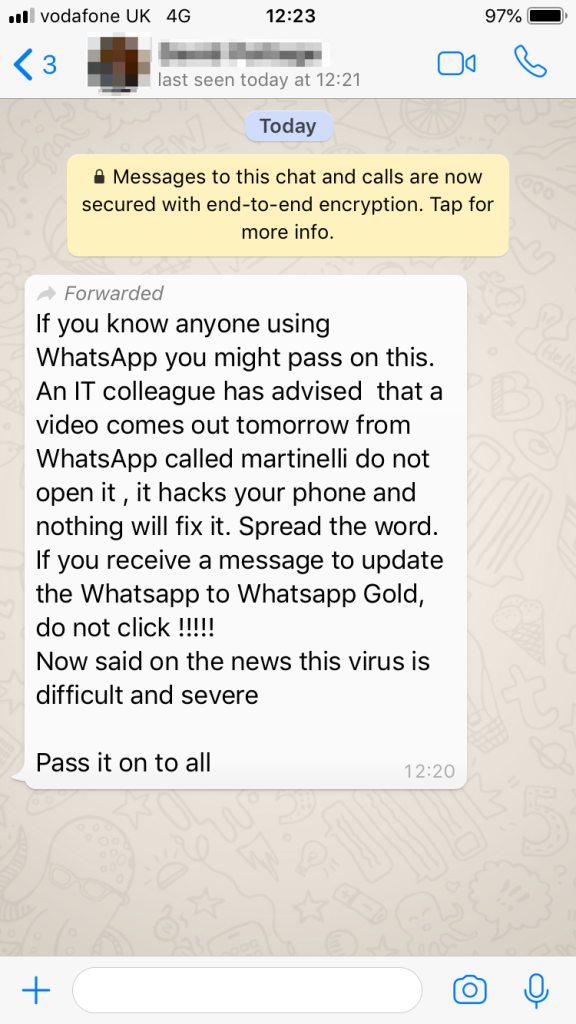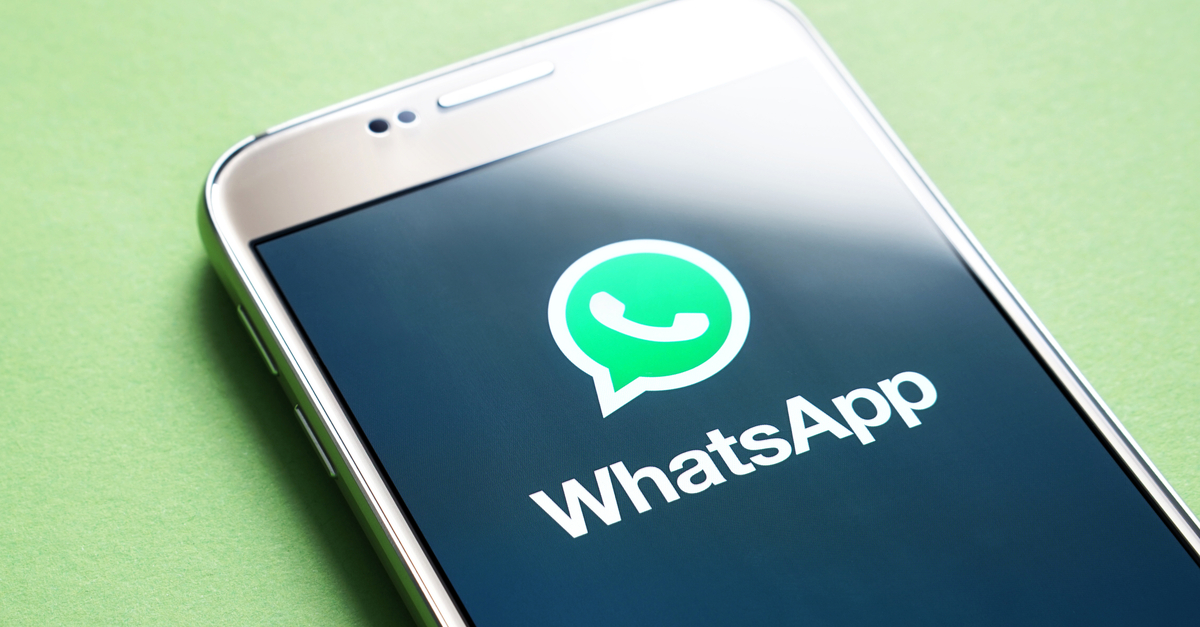Here’s a WhatsApp chain letter that’s been making the rounds:
If you know anyone using WhatsApp you might pass on this. An IT colleague has advised that a video comes out tomorrow from WhatsApp called martinelli do not open it , it hacks your phone and nothing will fix it. Spread the word. If you receive a message to update the Whatsapp to Whatsapp Gold, do not click !!!!!
Now said on the news this virus is difficult and severe
Pass it on to all
Received by a Sophos staffer, it might be easy to dismiss it offhand, given its mangled English-ish syntax.

Unfortunately, it’s only half rubbish. It’s a cocktail of one shot of bogus and one shot of authentic “yikes!” …It includes:
- A fictional threat: the “martinelli” video, supposedly carrying virus and mayhem.
- A real threat: WhatsApp Gold, a supposedly premium service offered by WhatsApp that’s anything but.
No. 1: The garbage you should ignore
According to Snopes, the martinelli hoax has been kicking around since at least mid-2017, picking up only minor word swaps but still retaining those arbitrary, really annoying extra spaces around punctuation.
Earlier versions:
Warning from An Garda. An IT expert has advised that a video comes out tomorrow from WhatsApp called martinelli do not open it , it hacks your phone and nothing will fix it. Spread the word
Tomorrow comes a video for whatsapp is called martinelli do not open it hacks the phone in 10 seconds and you can not stop in any way pass the data to yours and friends
Tomorrow, tomorrow, you’re only a day away. Except when it’s more than a year later, I suppose.
Snopes says that this chain letter seems to have originated in Spain. It was debunked by Spain’s Policía Nacional in July 2017:
Circula por #WhatsApp📱 este mensaje advirtiendo sobre el "vídeo de Martinelli"👉🏻#Stopbulos, ✋🏻no lo compartas https://t.co/TtAb0aYNUE pic.twitter.com/R4aOovWAo3
— Policía Nacional (@policia) July 29, 2017
Given that there apparently isn’t any “martinelli” video, WhatsApp users are safe from it. All they have to do is inform senders that they’ve been taken in by a chain letter, tell them to please stop forwarding it, and of course, refrain from forwarding it themselves.
What complicates the matter is the second element of truthfulness that the chain letter has acquired since it first arose: WhatsApp Gold truly is dangerous and deserves to have attention paid to it.
No. 2: The danger that’s real
As Snopes tells it, “WhatsApp Gold” scam messages have, for at least two and a half years and via varyingly worded messages, claimed that the new “premium service” would get users extra goodies, such as video calling and new emojis.
Hey Finally Secret WhatsApp golden version has been leaked, This version is used only by big celebrities. Now we can use it too.
Users who clicked on the link got no goodies. They got baddies, in the form of a non-WhatsApp website that told them to download malware nicknamed “WhatsApp Gold”.
What to do
So, because this scam contains a grain of truth, should you forward it, or some of it, and warn your friends?
No, please don’t. There is nothing new about WhatsApp Gold, and staying safe online means keeping out all the malware that’s out there, not just the one or two rogue applications you hear about from via friends’ WhatsApp messages.
Instead, just follow some simple advice to keep your phone secure, and advise your friends and family to do the same if they ask:
- Apply security updates promptly.
- Get your apps from the App Store or Google Play.
- Use security software like Sophos Mobile Security for iOS or Android.

Mrs Vanessa Keel
15th Nov 2019, and an old friend has just forwarded me a new whatsapp gold ‘warning’ message. Unfortunately, I’m sure she will have forwarded it to all her contacts (usually does). I sent her this page link in reply, and requested she write her own messages to warn people in future/just not forward. 🙈
Time will tell what damage our phones will suffer….
catnip
“Use security software like Sophos Mobile Security”
The correct advice would actually be: don’t use a mobile security app; mobile security is pretty tight, the majority of random security apps are ineffective, even (relatively) effective ones (of which sophos is one) are crippled by the relatively tight mobile security and are arguably more dangerous than no mobile security app because they create a false sense of security. Finally, don’t expect anything malicious you were dumb enough to install on a rooted phone to ever be detected.
Paul Ducklin
Your claim that Sophos’s product is “more dangerous than no mobile security app” is, errrr, a bit glib, don’t you think?